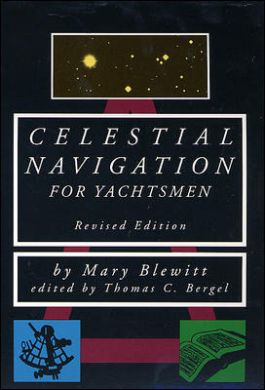Celestial Navigation for Yachtsmen
Receive via shipping:
- Print bound version of the complete text
Forewords
Preface
Editor's Note
The Theory
The Heavenly Bodies
The Geographical Position (GP)
Declination
Hour Angle
The Zenith
The Horizon
Altitude
Zenith Distance
The Elevated Pole
Azimuth and Azimuth Angle
Great Circles
Universal Time (UT)
The Position Line
Spherical Triangles
The Intercept
Sextant Altitude and Observed Altitude
Dip; Refraction; Semi-Diameter; Parallax
The Practice
Almanacs and Tables
Almanacs; Sight Reduction Tables
A Sun Sight in Winter
Using the Sextant; Recording the Sights; Correcting the Data; Using the Almanac; Using the Tables; Plotting the Sight
A Sun Sight in Summer
A Moon Sight
A Running Fix
Planet Sights
Meridian Sights
Star Sights
Sidereal Hour Angle; Declinations; Twilight and Preparation of Star Sights; Using the Meridian Passage
Pole Star Sights
Notes
Sextants
Calculators
"Short" Sight Reduction Tables
Practice Sights
Plotting Sheets
Appendices
A. Nautical Almanac, 1990, for December 6, 7, 8
B. Nautical Almanac, 1990, for July 15, 16, 17
C. Nautical Almanac, Increments and Corrections for 56m and 57m
D. Nautical Almanac, Altitude Correction Tables, 10 degrees - 90 degrees - Sun, Stars, Planets
E. Nautical Almanac, Altitude Correction Tables, 0 degrees - 35 degrees - Moon and 35 degrees - 90 degrees - Moon
F. H.O. 249 Vol. III for Lat. 52 degrees, Declination (15 degrees to 29 degrees) CONTRARY name to Latitude, LHA 69 to 0
G. H.O. 249 Vol. II or III, Table 5
H. Nautical Almanac, 1993, for October 10, 11, 12
I. H.O. 249 Vol. I, Epoch 1995.0, for LAT 33 degrees N, LHA Aries 0 to 179
Index
There is deep mystery and profound satisfaction in finding your position on earth by reference to the sun, moon, and stars--not to mention profound relief when the GPS receiver stops working in mid-passage. That is why knowledge of celestial navigation is still a rite of initiation, and its practice still a favorite pastime among serious cruisers.
That this edition of Celestial Navigation for Yachtsmen should appear 44 years after the first British edition and 27 years after its first publication in the U.S. is eloquent testimony to the author's clear, concise explanation of a difficult skill. Through those years, Celestial Navigation for Yachtsmen has been the best-known, best-loved primer on the subject throughout the English-speaking world. It successfully teaches sailors who have been demoralized by bigger books. It remains "the famous little book" on celestial navigation.
Among other changes, this edition substitutes the Nautical Almanac for the Air Almanac, discusses the "short" tables based on H.O. 211, expands the discussion in a few areas, fine-tunes it in others, and shows how to advance a line of position for a running fix from sun sights. The only mathematics involved are straightforward addition and subtraction.
Celestial Navigation for Yachtsmen has spawned many imitators over the years, but it's still the best--with this new edition more than ever.

